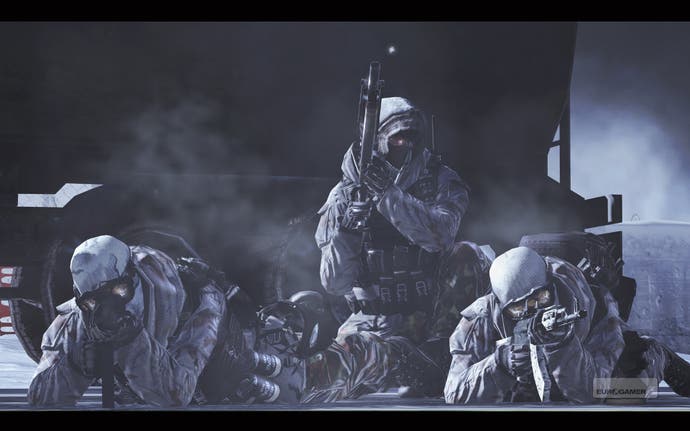Modern Warfare 2 review
Infinity and beyond?
Twice, Infinity Ward asks if you're absolutely sure you want to see it. The scene, the fourth you'll encounter in the most widely anticipated game of the year, could be "disturbing" or "offensive", repeats the warning. You smile and agree that, yes, you are sure you want to see it. This is a videogame. They give them 18 certificates, but only to appease people who don't really understand what's going on. Sure, the images of violence and bloodshed on Modern Warfare's battlefields can be disturbing to an onlooker, but death in a first-person shooter is a five-second setback, a micro-reincarnation designed to provide challenge and an impetus to improve, not distress.
Likewise, the crimson firework that explodes whenever bullet meets target is merely a visual cue to indicate another object removed from the shooting gallery, while the wash of blood that temporarily clouds your view when you're wounded is just a health gauge obfuscated. The orchestra-swells and military bombast? All window dressing for what is, essentially, Space Invaders evolved. You take cover behind walls and shoot aliens. In 1978, these were line-dancing pixel clusters from outer space. In 2009 they're Afghans. The metaphor's changed, but the principle remains the same: avoid missing headshot for high score. A videogame. Yes, I'm sure I want to see it.

The first three missions of Modern Warfare 2 do little to change your mind. The training level, set in a desert encampment somewhere in the Middle East, is literally a shooting gallery. You race from pillar to post, refreshing muscle memory, making split-second fire/hold-fire decisions, flitting between your rifle and pistol while racing against the clock to reach the end of the assault course. Not satisfied with your score? Have another go. Shave seconds from your time by improving your speed and accuracy. The sand particles billowing in the wind, the off-duty soldiers playing basketball in the communal yard and the throb of the noonday sun are of a fidelity not seen in games before, but the systems they dress are as old as videogame time.
Then you move out onto the streets of Afghanistan in the boots of one PFC Joseph Allen, 1st Battalion 75th Ranger regiment. The faded Arabic slogans daubed on the walls and the upturned supermarket trolleys under dilapidated bridges invest a foreign-correspondent air of believability into the scenario. But the unlikely hail of RPG-fire, screeching overhead jets, sub-bass thwap helicopters and balaclava-wearing hostiles ensure it's the 10 o'clock news played through a Michael Bay filter: reality, with the contrast turned up.
In the following level, now playing as British soldier Gary Sanderson in a duo mission with the understated Soap MacTavish, you tear down a snowy mountain in Kazakhstan on an implausibly fast snowmobile, steering with your right hand, taking down enemy riders with a pistol in your left. As you finally perform a Hollywood leap across a 40-foot ice ravine, the series settles into the sort of James Bond action preposterousness of which it's always managed to remain short.

Yeah. A videogame. I am absolutely sure that I want to see it.
The voiceover that precedes what will shortly become the most notorious scene in gaming makes it clear that your mission is a necessary one. You are a good guy, dressed as a bad guy, and while bad things are about to happen, good will out. Ding, and the lift doors unclasp. You step out onto an airport foyer, and into an entirely new idea of what constitutes an 18-certificate videogame.
You don't have to shoot. But you do have to observe. Forced into an unbreakable stroll, your only choices are where to look and whether to stay abreast of your murderous companions as they gun down the crowds of innocents, or whether to lag behind and administer a coup de grace to the terminal's terminally wounded. In contrast to the dry professionalism of soldiering displayed in the rest of the game, there's an inefficient laziness to this terrorist spree. The men fire from the hip in sweeping arcs, their purpose merely to create mayhem, not to eliminate threat.



